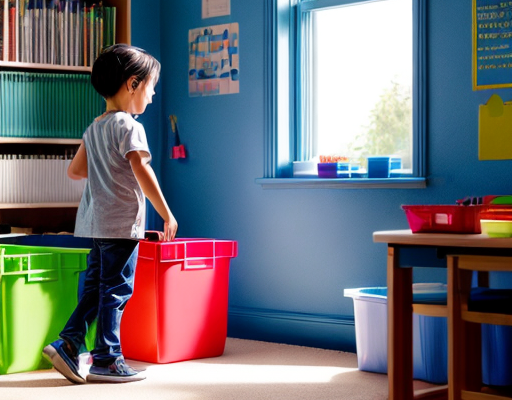
The Art of Teaching Kids to Be Organized
“`html
The Art of Teaching Kids to Be Organized
Introduction: Why Organizational Skills Matter for Kids
Instilling organizational skills in children at a young age is a gift that serves them throughout life. Being organized can lead to improved academic performance, less stress, and a better ability to manage one’s own time and resources. In this comprehensive guide, we will explore how parents and educators can teach kids the art of being organized.
Understanding Child Development and Organization
Before teaching kids to be organized, it’s important to understand their developmental stage. Each age has a different capacity for organizing, and what works for a teenager might not be suitable for a toddler. A basic understanding of these developmental stages will assist in setting realistic expectations.
Teaching Toddlers to Clean Up After Play
It’s never too early to introduce organization, beginning with simple tasks like cleaning up toys after playtime. Encouraging toddlers to participate in cleaning up teaches them that it’s a regular part of the playtime routine.
Elementary Strategies for School-Age Children
As children start attending school, organizational skills become critical. Assist them in setting up a homework station, using folders or binders, and creating a routine that includes daily homework and reading.
Setting the Example: Parental Organization
One of the most powerful ways to teach children to be organized is by modeling the behavior yourself. Let your kids see you making lists, keeping the home tidy, and planning for the week ahead. This sets a tangible example for them to follow.
Introducing Kids to Time Management
Time management is a key component of being organized. Help kids to understand the concept of time by using tools such as clocks, timers, and calendars. Give them responsibility for time-bound tasks like getting ready for school or completing chores within a set period.
Creating a Personalized Organizational System
Every child is different, so personalize organizational systems to match your child’s interests and abilities. Use colorful boxes for one child or tech-based apps for another – whatever resonates best with them.
The Use of Chores to Teach Responsibility
Chores are not only about helping out at home but also an excellent way to teach kids about organization and responsibility. Create a chores chart that outlines tasks and frequency, and ensure they follow through consistently.
Organizational Tools and Resources
Introduce kids to various organizational tools such as planners, apps, checklists, and color-coded systems. Show them how to use these tools effectively to organize their schoolwork and personal items.
Rewarding Organization: Positive Reinforcement
Reward systems encourage kids to remain organized. Use incentives such as stickers, extra playtime, or a small treat to acknowledge when they stick to their organizational tasks.
Teaching Decision Making Through Decluttering
Decluttering is a vital aspect of staying organized. Involve your kids in the process of choosing what to keep, donate, or throw away. This helps them learn decision-making and the importance of simplicity and order.
Using Technology to Enhance Organizational Skills
In the digital age, there are numerous apps and platforms designed to help with organizing. Teach older kids to use digital calendars, task managers, and reminder apps to keep track of their schedules and obligations.
Overcoming Challenges and Resistance
Resistance to organization is natural, especially in the beginning. When challenges arise, it’s important to stay patient, offer guidance, and consider what barriers may be preventing them from achieving organizational success.
The Role of Schools in Developing Organizational Skills
Schools play a significant part in teaching organization. Participate in your child’s school life by attending parent-teacher meetings and understanding how teachers promote organization in the classroom. Reinforce these skills at home for consistency.
Maintaining an Ongoing Conversation About Organization
Organizational skills are not a one-time lesson but an ongoing conversation. Regularly discuss with your children how they can improve their organizational skills and how these skills benefit them in their daily lives.
Adapting to Each Child’s Unique Learning Style
Every child learns differently, so it’s essential to tailor your approach to each child’s unique learning style. Visual, auditory, and kinesthetic learners will all benefit from different methods and tools for organization.
The Role of Routine in Building Organizational Habits
Routines are foundational for developing good organizational habits. Establish a daily and weekly routine that includes set times for homework, chores, and leisure. Over time, these routines become second nature.
Incorporating Fun into Organizational Activities
Make organization fun by incorporating creative and enjoyable elements, such as turning cleaning into a game or using decorative labels for storage. This makes the process more engaging for children.
Promoting Independence Through Organizational Skills
One of the ultimate goals of teaching kids to be organized is to foster independence. As they grow more adept at managing their belongings and time, they will feel more confident to take on new challenges and responsibilities.
Conclusion: A Lifelong Investment
Taught well, organizational skills equip children for success in school, career, and personal life. Invest the time and effort into teaching these skills now, and watch as your child thrives in the organized world they create for themselves.
“`

